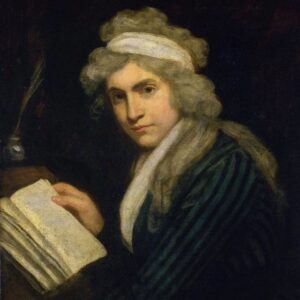Mary Wollstonecraft was born on April 27th, 1759, in London, England. She was the second daughter of an abusive, alcoholic father. Besides, he drained the family financially. From her youth, she was very protective of her mother and sisters. However, she did not receive a proper education.
She left home in 1778 to be a companion of a widow called Sarah Dawson. However, she left three years later to take care of her mother. She looked after her until she died in the spring of 1781. Later, she went to live with her friend Fanny Blood.
In 1784, Wollstonecraft, her sister Eliza, and Blood founded a school. The death of Blood during childbirth a year later was another hard blow to Mary’s life. The school closed in 1786. However, it inspired her to write a book on the importance of girl education called Thoughts on the Education of Daughters.

✟ September 10, 1797, London, UK
Authoress and Feminist
In 1788, a liberal publisher, Joseph Johnson, employed her as a translator and helped Wollstonecraft publish her books. Her 1790 A Vindication of the Rights of Men refuses the opinion of Edmund Burke that the French revolution would fail. Instead, she advocated for republicanism over aristocracy. Her arguments are similar to what her associate, Thomas Paine, wrote in Rights of Man.
However, her call for change did not end just here. A Vindication of the Rights of Woman from 1792 is her most famous book. Mary Wollstonecraft was one of the first to call for equal rights for both men and women. Hence, it made her one of the first feminists. Besides, she inspired John Stuart Mill and his wife.
She traveled to France to witness the French Revolution. There she met an American, Gilbert Imlay, married him, and had their first daughter Fanny. However, the marriage did not last, and she returned to London.
In London, she attempted suicide. Later, she married William Godwin. Mary Wollstonecraft died during childbirth on September 10th, 1797, in London. Her second daughter, Mary Shelley, survived and became a famous author, writing Frankenstein.
“I do not wish women to have power over men but over themselves.”
Mary Wollstonecraft
